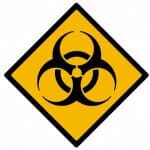Paint Waste Is An Expensive By-Product
 Waste streams in body shops are an expensive by-product of painting and maintaining spray gun cleanliness. Waste management in many cases cost shops from $300 to $1,200 for each fifty-five gallon drum of waste. At BECCA, we encounter shops having one to two drums of waterborne waste being removed on a monthly basis. Poor cleaning practices and the number of vehicles painted are the cause. Therefore, controlling waste streams can be difficult to maintain in many cases. BECCA’s recommended 3P System addresses reducing waste produced in body shops from cleaning spray guns.
Waste streams in body shops are an expensive by-product of painting and maintaining spray gun cleanliness. Waste management in many cases cost shops from $300 to $1,200 for each fifty-five gallon drum of waste. At BECCA, we encounter shops having one to two drums of waterborne waste being removed on a monthly basis. Poor cleaning practices and the number of vehicles painted are the cause. Therefore, controlling waste streams can be difficult to maintain in many cases. BECCA’s recommended 3P System addresses reducing waste produced in body shops from cleaning spray guns.

Most body shops acknowledge that throwing out any waste paint is frowned upon within the industry. OSHA, EPA, or other agencies, will gladly send over a hefty fine to ensure body shops are not trashing liquid paint. With the BECCA’s 3P System, waste management for paints now a much easier process for painters to maintain, as well as, more affordable to the body shops.
 Waterborne Waste
Waterborne Waste
 BECCA’s recommended 3P System utilizes H2O Dry as a solution to waste paint and waste generated from waterborne spray gun cleaning processes. H2O Dry works as an absorbent, which solidifies paint waste, thus once waste is solidified it may be disposed (once tested). Waterborne waste, even without solvent, is considered hazardous waste prior to testing. Fines are possible when waste is not properly tested prior to disposal.
BECCA’s recommended 3P System utilizes H2O Dry as a solution to waste paint and waste generated from waterborne spray gun cleaning processes. H2O Dry works as an absorbent, which solidifies paint waste, thus once waste is solidified it may be disposed (once tested). Waterborne waste, even without solvent, is considered hazardous waste prior to testing. Fines are possible when waste is not properly tested prior to disposal.
 Solvent Waste
Solvent Waste

With BECCA’s 3P System, we recommend filtration recycling versus distillation. BECCA’s filtration package can be filtered down to 75 micron or 25 micron. Both provide a less expensive method of recycling solvent and reusing solvent without the cost of purchasing a distillation recycler. We recommend filtration replacements every 3-6 months. These replacement filters cost on average $119 or $178, depending on the filtration package selected. Filtration significantly reduces hazardous waste that is generated and solvent that is being used in the process.
Note: Filters for solvent are still to be discarded as hazardous waste.
To read more on Recycling and Waste Management Methods read “Waste Paint Can Cost Shops Big Money” READ ARTICLE>>>

